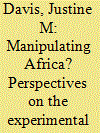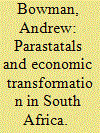|
|
|
Sort Order |
|
|
|
Items / Page
|
|
|
|
|
|
|
| Srl | Item |
| 1 |
ID:
174644


|
|
|
|
|
| Summary/Abstract |
Over the past decade, a body of scholarship on civilian self-protection (CSP) has emerged, advancing understandings of civilian agency in war. In this article, we argue that CSP has been conceptualized in a narrow manner, reflecting the nascent status of the field. Scholars have focused on responses to threats directly related to the dynamics of conflict, physical in nature, and caused by the presence of armed groups. Using the case study of the Protection of Civilians (PoC) sites in South Sudan and drawing on over 150 interviews, we identify one type of protective response neglected in the literature: community and popular justice. Although the PoC sites provide a measure of protection, residents face a range of daily threats that are indirectly related to the conflict, such as crime. In this context, community justice emerged as a natural response, an overlooked yet vital form of CSP that addresses immediate protection needs and fulfills a social ordering function. By conceiving of justice in this way, this article aims to deepen understanding of civilian agency and start a conversation with scholars and practitioners about the boundaries of (self) protection.
|
|
|
|
|
|
|
|
|
|
|
|
|
|
|
|
| 2 |
ID:
174643


|
|
|
|
|
| Summary/Abstract |
Increased legal access and the devolution of natural resource administration are generally seen as sources of power for local communities and their institutions. However, beyond this widely held expectation, the politics of land reform suggest that legal recognition of rights and devolution is not the only issue with implications for communal tenure reforms. Misconceptions about communal tenure, which are rooted in history, and their appropriation by local elites in the processes of communal tenure reform are characteristic of both colonial and post-colonial governments in Kenya. Although typically articulated and promulgated to enhance political representation and to devolve control over resources to the local level, unresolved issues in the reform process have worked to undermine the legitimacy of communal land rights in contemporary Kenyan society. A case study of the post-2010 community land legislation process demonstrates the continuing relevance of historically conditioned political and ideological representations of communal tenure built during the colonial period and reproduced in policy in independent Kenya. This paper offers reflections on the centrality of sustained communal tenure misconceptions, fetishization of formal governance institutions, and the institutional and power configurations that primarily benefit powerful stakeholders as sources of the current breakdown in the implementation of community land law.
|
|
|
|
|
|
|
|
|
|
|
|
|
|
|
|
| 3 |
ID:
174647


|
|
|
|
|
| Summary/Abstract |
A push for evidence-based approaches to the study of politics, dubbed the ‘credibility revolution’, has resulted in a proliferation of experiments and randomized control trials (RCTs) in Africa. The current emphasis on the strength of the experimental method has vast ramifications for our understanding of political phenomena and real-world realities faced by local populations. Yet, very little work focuses on the practical challenges that may arise if and when researchers and students decide to use this method.
|
|
|
|
|
|
|
|
|
|
|
|
|
|
|
|
| 4 |
ID:
174642


|
|
|
|
|
| Summary/Abstract |
The functioning of markets is premised on the creation of collaborative relationships and networks. Food markets in Zimbabwe are evolving in response to state interventions that aim to restructure the marketplace and the flow of produce. This article explores Mbare Musika, the oldest and largest marketplace in Harare supplying the city with fresh fruit and vegetables. We analyse Mbare Musika from the perspective of the interactions among farmers and retailers, vendors, transporters, intermediaries, officials, and customers, in creating and sustaining a specific enduring market. We use actor narratives to understand the ordering and (re)ordering of people and produce in the context of informalization, shifting polycentric relationships, and market infrastructure to sustain livelihoods anchored on the circulation of large volumes of diverse fresh produce. The market is overtly economic in outlook but, intrinsically, it is a social arena where discourses are continuously reconstructed, reproduced, and expressed through daily interactions. We situate Mbare Musika in past and present sociopolitical processes of transformation in Zimbabwe.
|
|
|
|
|
|
|
|
|
|
|
|
|
|
|
|
| 5 |
ID:
174648


|
|
|
|
|
| Summary/Abstract |
Mozambique’s 2019 elections resulted in a landslide victory for the incumbent Frelimo party, but they were also characterized by unprecedented levels of election related violence and other irregularities. The briefing demonstrates that polarization, which has been a common feature of Mozambican politics since independence, has become more pernicious at least since 2013. As is the case in other countries, pernicious polarization is contributing to rising authoritarianism in Mozambique. The briefing traces the roots of pernicious polarization, its shifting dynamics over the last several years, and its impact on the exercise of democratic rights in Mozambique’s recent elections.
|
|
|
|
|
|
|
|
|
|
|
|
|
|
|
|
| 6 |
ID:
174645


|
|
|
|
|
| Summary/Abstract |
This article analyses the causes, outcomes, and political significance of the inter-connected operational, financial, and governance crises afflicting Eskom, South Africa’s electricity parastatal. These crises emerged in the context of African National Congress initiatives to turn Eskom and other key parastatals into instruments of an envisaged South African developmental state, through increased investment and strategic procurement to support economic transformation goals. Instead, Eskom’s spiralling costs, procurement irregularities and inability to translate increased investment into functional new infrastructure meant it impeded these goals. Its indebtedness became a severe macro-economic risk, making Eskom a precarious nexus for the circulation of public funds, while the cost and unreliability of electricity has undermined South Africa’s energy-intensive industrial core. Intertwined with this were multiple high-profile corruption scandals associated with the ‘state-capture’ controversies of the latter stages of Jacob Zuma’s presidency. The article argues that Eskom’s extreme dysfunctionality results from long-running, and as yet unresolved, contestation of the parastatal and electricity policy more broadly by various interest groups, in a context of an increasingly fragmented political and business elite. This created a range of incoherent distributional pressures and institutional constraints. Rather than a straightforward outcome of corruption and ‘state capture’, this reflects deeper tensions in the post-apartheid political economy.
|
|
|
|
|
|
|
|
|
|
|
|
|
|
|
|
| 7 |
ID:
174646


|
|
|
|
|
| Summary/Abstract |
The Chinese-run construction sites that have emerged across the Ethiopian landscape over the past two decades have given rise to a pidgin—a contact language that facilitates communication between Chinese managers and the Ethiopian labourers under their direction. By unravelling the nature of this pidgin, including its lexicon, syntax, and semantics, this article discusses the power dynamics in Ethiopian–Chinese encounters through the lens of language. A prototypical contact language at first blush, the pidgin spoken on Chinese road projects in Ethiopia is different from pidgins that emerged in colonial Africa. Its structure and use reveal that power relations between Chinese management and Ethiopian rank and file are less asymmetrical than often portrayed. As a site of contestation as much as collaboration, pidgin has in fact become one of the domains in which power is negotiated. By hijacking words and manipulating their meanings, Ethiopian workers play with pidgin in an attempt to confront expatriate management and challenge the sociopolitical asymmetries that the growing Chinese presence in their country has brought forth.
|
|
|
|
|
|
|
|
|
|
|
|
|
|
|
|
|
|
|
|
|